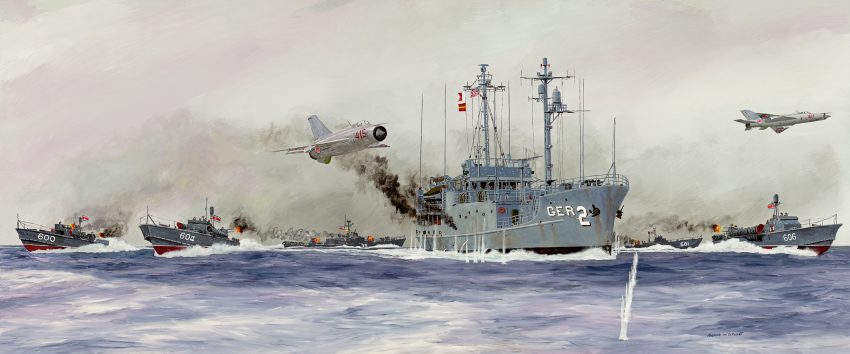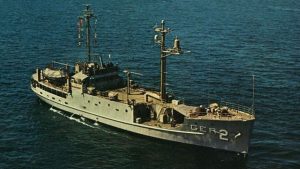The more things change the more they stay the same. That particular aphorism may be wearing pretty thin of late but it sure fits this particular anniversary. Members of the “below 50” demographic may remember reading or hearing about it in the Cold War chapter of a high school U.S. History course. Yours Truly was a wide-eyed third grader at Kendall Elementary when America learned of the seizure of the USS Pueblo by the North Koreans on the evening news. Fifty years ago today that aforementioned Cold War became very hot when naval and air forces of the Democratic People’s Republic of Korea fired on, boarded, took the Captain, officers and crew prisoner, seized the vessel and took it to Wonsan. This action was undertaken by the DPRK forces despite the ship being in international waters beyond the recognized 12 mile limit. Fireman Duane D. Hodges was killed when a round penetrated a bulkhead striking him and likely severing a femoral artery. For the surviving 82 officers and crew, the next eleven months proved to be a day by day mission of surviving torture, starvation, exploitation, abuse and neglect. Negotiations finally secured their release and repatriation the following December. The Captain and crew received POW recognition some 22 years after the fact. The men may have been returned but the ship never was. USS Pueblo (AGER-2) remains an active vessel on the U.S. Navy register but actually serves as a museum piece for the North Korean government in Pyongyang.
Much about the Pueblo seizure has been analyzed, written and explained. I vividly remember watching the made-for-TV-movie PUEBLO in the eighth grade in 1973. Hal Holbrook delivered a convincing performance as LCDR Lloyd M. Bucher.
A few years ago Yours Truly made a unique connection with this particular historic event. It was at a ship reunion in Branson, MO for the vessel I served aboard in my enlisted Navy career, USS Robison (DDG-12). In attendance were three dozen or so old fleet sailors representing nearly all thirty years of the ship’s service from plankowners to decom crew. Among them was a fellow who served at Ship’s Navigator and N/X Division Officer from 1964-66 (the same division Yours Truly would become a member of some fifteen years later). He introduced himself as Ed Murphy. His claim to fame however was not as navigator of Robison. It was being Executive Officer of USS Pueblo when the ship was seized by the DPRK. Ed proved to be a wealth of information about the entire incident, from the preparation for deployment to compromise of the mission to the boarding and capture and much of the abuse of captivity. It was the ship’s maiden voyage and it was loaded to the max with classified equipment and information. When the 82 officers and crew were finally returned on 23 December 1968, Captain Bucher led the way and Ed was the last man across the “Bridge of No Return” at Panmunjom. Meeting him was a humbling experience.
LT. Edward Murphy, XO of USS Pueblo
At the next USS Robison reunion, which was held in San Diego, we caught up with each other yet again. Ed and his wife, Carol, live in the San Diego community of El Cajon. Ed explained to me that when the producers of that above linked made-for-TV movie about the Pueblo ordeal were getting all the officers and crew to sign releases, he declined. According to Ed, all the fallout from the incident pretty much ended his naval career. He did write and publish his own version of events. His book is entitled Second in Command which is now out of print but old copies can be found via his website: www.puebloexec.com
Ed Murphy with Yours Truly
It was around the time that I met Ed that certain disclosers were made by the National Security Archive that convicted spy John Anthony Walker, Jr. had introduced himself to Soviet operatives just prior to the seizure of the Pueblo. The North Koreans seized the vessel at the behest of the Soviets in order to make better use of Walker’s spying. Indeed, they did share much of the information gleaned from Pueblo’s classified documents with the Soviets which enabled them to gain access to the U.S. Naval communications system. This continued into the late 1980s when the system was revamped.
As I stated up front, the more things change the more they stay the same. The American relationship with North Korea is every bit as icy as it was fifty years ago this week and now, with ICBM and nuclear capability in the mix, the future of that relationship does not appear at all favorable. The DPRK is just as brutal today as it always has been and I fear those on the frontline who will be first to meet any aggression by that regime are at a high risk of being undermined by fellow Americans seeking financial gain by selling out to Russian spies. Commander Bucher passed away in 2004 but many former Pueblo crew are still living and still seeking reparations from North Korea. If the DPRK eventually does seek to improve relations with the United States, they can start by returning our ship.




